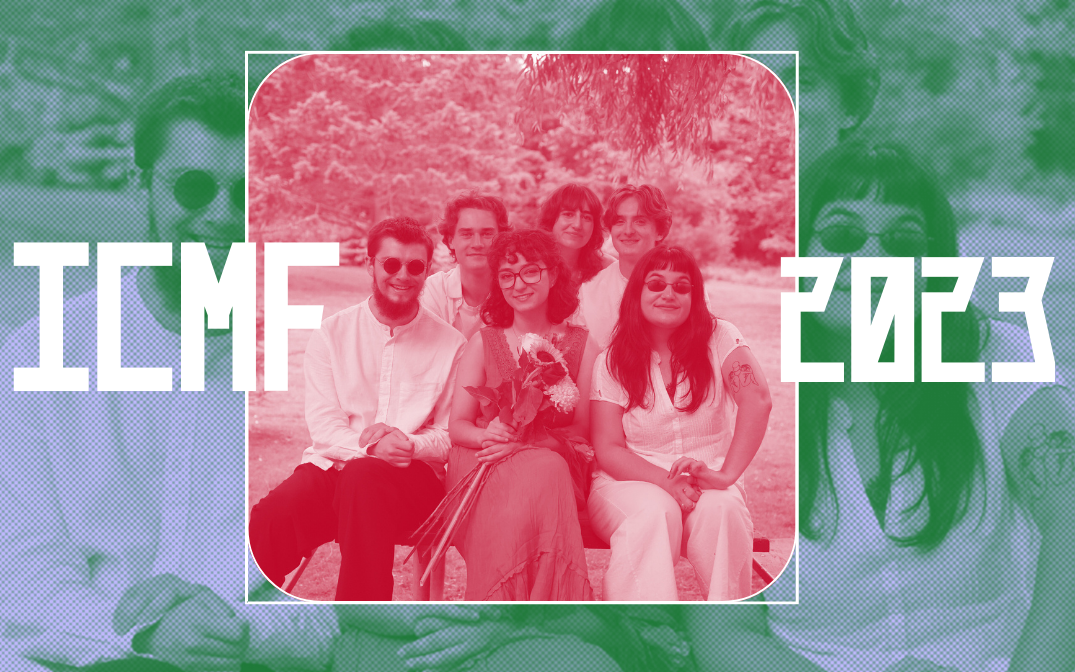
Carmine: Something is Awake
Sunday, September 17, 2023
$20 Regular | $18 Friends | $10 Students
Now in its third year, the Intercultural and Creative Music Fellowship is a project aimed at fostering a greater intercultural understanding of Muslim heritage in music and film while also helping emerging artists achieve greater professional experience. With an emphasis on community and collaboration, Humber College and the Aga Khan Museum share a belief that interconnected communities of artists and performers can create substantial system-wide change and break down social barriers.
In the summer of 2023, nine Humber College students worked together for 14 weeks to form Carmine. They created and recorded five songs, two films, a physical zine, and a series of digital art as part of an album titled Something is Awake. Deeply inspired by the Museum’s Rumi exhibition, this endeavour embarks on a soul-stirring exploration of timeless themes such as love, life, and death, delving into the heart of Sufism and the transformative power of our collective consciousness.
Presented with support from Bashir and Farida Dhanani and Family.
The Museum’s Performing Arts programming is generously supported by the Nanji Family Foundation.
Artists
Aaron Blewett | Drums and Percussion
Jessie Gosling | Voice and Acoustic Guitar
Tami Sorovaiski | Electric and Upright Bass
Simon Williams | Piano, Keyboards, and Synthesizers
Joel Bracken | Saxophones and Flute
Carolina Lopez | Voice and Electric Guitar
Joshua Yiu | Video Director
Anthony Estridge | Director of Photography
Siddhi Malviya | Visual Designer
Song Stories

“Water Lily” was inspired by the Rumi poem, The Dream That Must Be Interpreted. It was expanded into a spoken word poem and art installation at the Aga Khan Museum by Erdem Taşdelen.
The poem reads:
We began as
a mineral. We emerged into plant life
and into animal state, and then into being human,
and always, we have forgotten our former states,
except in early spring when we slightly recall being green again…
…and though we seem to be sleeping,
there is an inner wakefulness
that directs the dream,
and that will eventually startle us back
to the truth of who we are.
This poem inspired the line, “Something is awake beneath your skin,” touching on the dreamlike state of our existence and the push we feel collectively as living creatures. It may present differently, but the outcome is the same — a drive. The song is intended to feel like and convey this reflective, collective dream state. Water was also a common theme in the fellows’ ideas — depicted as a necessary force in the world that binds us. Six artifacts from Rumi and the Museum Collections Gallery were used to inform our colouristic choices of harmony — assigning notes to the colours within the images, picking and choosing what best represented, conveyed, and married all these ideas and elements.
Focused on introspections about the human experience, “Eclipse Again” compares life to a fountain. Much like a fountain takes the same water and filters it repeatedly, “Eclipse Again” shows the overlapping and ever-flowing life force that exists between something as small as a human and as large as the solar system. For this reason, “the breath” is a recurring theme in the lyrics — It flows through us constantly and exists outside us simultaneously. Musically, the song follows one main vocal motif inspired by the work the fellows did with their producer, Maryem Hassan Tollar. In many ways, the increasing energy throughout the song makes it feel like a gradual reckoning followed by the peace that comes with falling into a flow. This whole project pulled inspiration from Rumi’s poetry, focusing on themes of unity. “Eclipse Again” is also a nod to the themes explored in Water Lily. In its essence, the song is about appreciating and realizing the beauty of cycles and the likeness between all things.
The song’s climax, where the cymbals and synthesizers create a wall of sound, evocates the awe and intensity felt during an eclipse —a naturally occurring wonder of existence.


“Shams,” a song about longing and loss, was directly inspired by the story of Shams and Rumi. It was inspired by the spiritual connection that the two mystics had and how their time together, though perhaps brief, inspired tens of thousands of verses from Rumi in a collection called the Divan of Shams of Tabriz. “Shams,” the song, opens with the line, “This air chased a match/To break into a wildfire/That soon would eat us both.” Air, often representing intellect and communication, depicts the start of Rumi and Sham’s connection. Though there are a few variations on how they met, there is always an element of Shams challenging Rumi’s knowledge or beliefs. The song evokes incompleteness, and in its harmony, melody, and lyrics, “Shams” is meant to evoke the feeling of the hot sun and a burning devotion.
“Veil” is a reflection on life from the end and an abstract story told in retrospect by someone who is transitioning into the afterlife. Shaykh al-Qashani tells of the four deaths a Sufi will experience: the black death of suffering, the white death of hunger, the red death of lust, and the green death of the ego.
These different deaths make up the sections of “Veil.”
Leaning into Rumi’s idea that we are asleep until we die, this song is about accepting death as something different, not something to fear. Seeing it as something that will unveil the haze of living. The song’s title was directly inspired by a Rumi poem that states:
In our hearts, there burns a fire
That burns all veils to their root and foundation
When those veils have burned away
Then the heart will understand completely.

The song ends with the death of ego, marked by the end of all solos when the synths sweep in to wash away all that was the song before. “Veil” is a jarring and forced acceptance of death — neither sad nor mournful yet impactful, nonetheless.

“Our Garden” symbolizes a resurrection, transcendence, and sunrise. It’s a celebratory piece, intentionally placed at the end of the album and performance as a reminder that the world we are surrounded by is full of light and joy and that we should not take ourselves too seriously. At its core, “Our Garden” is a love song, not in a romantic way, but rather in a euphoric and holistic way, full of surrender and acceptance to the flow of the world around you — learning to love in all its various forms.
We are the garden, you are the garden, I am the garden.
As without the soil, nothing would grow.
The song is a sunny day. It is the fruit dripping down your chin. It’s the laughter held with friends, and oh how lovely the nature of it all is.
Instances of allusion within the project:
- The upright piano in “Eclipse Again” is reminiscent of the upright piano in “Water Lily.”
- The break in “Veil” before the improvised cacophony refers to the breaks in “Eclipse Again” and “Shams.”
- The rhythmic moment right before the break in “Shams” foreshadows the chorus of “Our Garden.”
Presented in partnership with:
